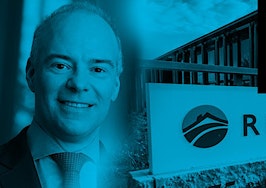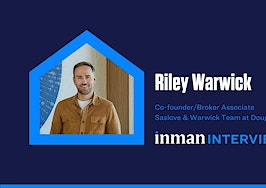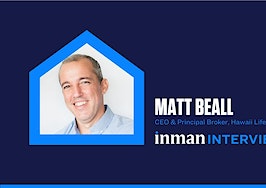Kate Rossi, the regional executive vice president of Coldwell Banker NRT’s eastern region has a long history with the real estate industry that started in sales. Unlike a lot of current leaders, she climbed the ladder within the industry.

Kate Rossi | Credit: NRT
Rossi is one of several women leaders at the regional level within Realogy, and she oversees 17,000 independent sales associates and about 300 offices across the local operating companies.
Under Rossi, NRT’s eastern region — which is comprised of 12 states — closed more than $47 billion in sales and 123,929 transactions in 2017. Those numbers alone would have made the region the third most productive brokerage on the Real Trends 500, behind NRT and HomeServices of America.
Rossi recently spoke with Inman about her background, competition with tech-focused brokerages and why Realtors have the most honorable job in America. This conversation was edited for length and clarity.
Unlike a lot of leaders in real estate, your background is as a Realtor first. What is the motivation from making the move to from Realtor to leadership for you?
Well, to be honest, I never thought I would get into management. I never, ever, ever. I loved being a sales agent, it was a great job. But in 1984 a company called Coldwell Banker purchased us and I was with a small boutique at the time.
And my manager at the time walked out the door and said, “I’m not going to work for a big company.” Because at that point, we were the first East Coast company they bought, it was more of a West Coast company, so no one had ever heard of Coldwell Banker. And so she left that day.
And then my boss at the time said “Kate, could you watch the office till we find someone?” And at that point, I had over 100 and some listings and I was like, I don’t want management. He’s said, “well, Kate you are the office, could you just placate me here until I find someone?”
So I went to my first management meeting. And got so, like, caught up in it because they were talking about, you know, recruiting and blah, blah, blah, and all this stuff. So I just started doing it. And 37 years later, I’m still doing it. So that’s kind of how I got into management. It wasn’t my intention. But I fell in love with helping other people.

Consumers looking at Coldwell Banker listings. (Credit: Coldwell Banker)
Does having that background as a Realtor help you connect with your agents better? A lot of executives come from other executive roles, how generally does it help you?
Well, I speak a lot, and I come from their shoes. So I don’t know if it’s better, but it sure does help me. I understand the trade, I understand what a commissioned salesperson has to do. I was a single mom, I had to raise my daughter, I had to make money, I had to do those transactions, it wasn’t optional for me.
So I understand when a transaction is not going the way, it needs to go. I understand when they don’t have inventory and they feel like they’re out of business. So I’m able to teach them what they need to do. And I think that does help me in the field where people relate that I’ve done it. And so they link to me more.
Does that background lend itself to the education programs you have at NRT? And how big of a component is education because of your background?
I think education is huge and that’s why I teach classes. I can help somebody understand that this is a job. I think, the perception is, we make a lot of money, we drive nice cars, but if you don’t work this job — I teach people how to get the inventory what they need to do in order to be successful.
I think that that does help and I love that Coldwell Banker you know, we have these new programs, the AMP! program, List to Last. The education is there if the agent wants to take advantage of it, where I see other companies, they talk a good game, but we really are a hands-on organization.
In teaching some of those classes and working with so many new agents what are some of the most common mistakes you see?
Prospecting is our core piece of the business, you can’t be secret agents. We have to talk to people about selling real estate. Most people have a fear of prospecting, of picking up a phone and calling for-sale-by-owners, expireds, call around the sphere, call around for listings.
Something triggers in their head that they just feel like — I hear this all the time, they don’t want to be rejected. And in my mind, that isn’t rejection that’s just getting you closer to the, “Yes.” You know, the more “No’s” you get, get you closer to the “Yes,” because we’re offering a service. We don’t just sell homes. We just truly don’t sell homes.
I can sell you probably just about anything. People have said that about me. I have a gift of gab here. So I would say that people have to — we’re more counselors, we’re more educators to walk the person through because this is the biggest investment most people ever have in a lifetime. So we walk them through the transaction.
But prospecting is key, that you’re offering a service to people out there that really do need the help of an agent. People think they sold something on eBay and they can sell a home. It’s too big of an investment to try to sell it and go it alone. You need a professional real estate agent that has the negotiating skills and all that good stuff that goes along with that.
Are new disruptive models — discount brokerages, virtual brokerages, tech-focused brokerages — pulling agents away from prospecting?
You know what is so funny, Patrick, that they’re really tech companies. And the reason they’re trying to lure our agents is because they know the technology is nothing. It’s a tool that helps an agent be more informed and inform the consumer.
So they’re trying to attract our agents because they don’t have that piece of the puzzle. They’re trying to sell their technology out there. We’re a real estate company that invests heavily — I think we spent $75 million last year on technology.
So we’re a real estate company that has the technology. So we have the people and the tech, where these tech companies are out there trying to attract our agents because they’re trying to sell their tech
Do you think their shelf-life won’t be long because of that?
Patrick, I’ve been doing this 37 years, there’s always shelf life for whomever comes into the marketplace. This group of this new wave, you know, androids or whatever, they are coming into the marketplace, they’ve got a lot of cash flow behind them.
So I think at some point, the investors are going to say, like, when does it start making money? And so that’ll just depend on when they run out of cash.

Coldwell Banker yard sign. (Credit: Associated Press)
What do you think is the biggest threat to the more traditional real estate brokerage then?
Education. I think people perceive it as not a difficult transaction until they go through it. So the more educated we can make the consumer, the more information, the negotiating skills of a top producer, somebody that really knows what they’re doing, they don’t make somebody give their home away, they negotiate the correct price for the consumer. And I think that people don’t perceive that all the time.
They have a misconception that we make a lot of money, and we just put a sign in the yard and an ad in the paper. There’s a technique with marketing the property and the exposure to the property. Exposure is everything and pricing.
You have to know how, you have to have a negotiator there to price the property correctly — that’s the agent. It’s just an education process. So, I think the more informed the consumer is about what a Realtor really does, they’d never do it alone.
How can you ensure that NRT’s value proposition shines through when you are recruiting agents against all of these kinds of different and disruptive models?
Like I said, I think it’s the knowledge, it’s the power of really knowing what you’re doing. We’re a national and international company, and you don’t need a compass to find us.
After everything is said and done, our presence is known in that we have 92 or 93 brand recognition. You go on an airplane with 100 people, 92 people know Coldwell Banker. The brand locked with a top producer that carries their own brand is a powerful combination.
Any exposure to the property, the more exposure that you could show a property to, we’re on 900 plus websites, we get those properties out there. And the army alone that Coldwell Banker has, just that exposure with none of these small startup companies can even compare.
Is that kind of size ever a hindrance? I mean, when you want to implement something new or make some changes, you oversee a lot of sales agents. Is it ever difficult to move quickly with such a big company?
Well, you know, it just depends on what you’re defining as difficult. Getting the message out and getting everyone up to speed and educated sometimes that is a task, but if we’re all talking the same thing, our trainers, our managers, our regional, our president, myself, we have an army to deliver the message.
So I think it is a challenge somewhat to get everybody up to speed, but it’s like anything else, you could have a very small organization and they’re not up to speed. It’s just how we get the message out to everybody. And it’s all hands on deck when we deliver something.
Does that make it all the more important to assemble a good team around you with such a big company? Obviously, you can’t do everything alone. What are you looking for when you’re kind of assembling your leadership team to help guide such a big company?
I look for enthusiasm and energy first, I could teach all the other stuff. But if people have passion, if people really love this industry and love what they do. I take a chance on somebody like that, rather than somebody that has a lot of book knowledge and says everything right but has no enthusiasm.
It’s because we’re dealing with independent contractors that, they have to earn a living and they go out there every day and you can’t deliver the message and be deadpan you have to have some passion about it. And I see my best leaders, they deliver the message well, and people trust them and will follow them anywhere. And that’s key. If you don’t have any passion, you shouldn’t be in this business.
How are you preparing NRT for the next market downturn? Obviously, things are shifting a little bit in the market. We’ve seen sales go down and prices are still going up, but they’ve leveled off a little bit. How do you educate and prepare your sales agents to weather the storm so to speak?
I worked in one of the worst markets ever. The interest rates were 18 percent, I was in a town called Pittsburgh, Pennsylvania in the 1980s when steel mills were shutting down, left and right and I made a ton of money because I carried inventory. The company or the agent that controls the inventory will win.
It doesn’t matter what the market is because it’s the American dream. Most people want to own a home. That’s their passion. People come to this country for that — to have homeownership. So what we’re preparing for is to control the market share, control the inventory and we’ll control the destiny.
We will never have a down market as long as people are buying homes. I think several years back when the mortgage companies tanked, that was a challenge because people started to doubt, why real estate? When real estate agents don’t work, America stops. I think that’s the greatest job.
The most honorable job in the world is a real estate agent.
Because after everything is said and done, when you sell a home, you love it that day, until you move in that night. ‘Honey, this is beautiful, but maybe we should change this carpet, I think we need new furniture, now, let’s do some landscaping. Let’s add an addition. Let’s do this.’ Guess what happens? Because of all the things, because of one transaction, all those people go to work: furniture stores, painters, electricians, plumbers, it everything happens because of the one transaction you can’t tell me anything else that you sell that anybody sells, that creates that much activity around a property.
So I always say Realtors move America, when they sell a home, they’re moving America. So I don’t think there’s ever a transaction downtime as long as the inventory is selling and the person and the company that carries the most inventory will always have a great market.
So one of the reasons I was excited to talk to you is because there’s not a ton of women in leadership in the real estate industry. Obviously, the majority of Realtors are women. Why do you think the industry has such a difficult time elevating women to leadership positions?
Anytime I can promote — I’ve put presidents as the females into the leadership roles — I will do that. But I look basically for the talented people. I don’t look at gender so much.
If there is a talented person and they’re female, to me, it’s a home run. You know, people say that, maybe some women don’t, they don’t choose to get into management. A lot of my top guns, you know, they’re happy with selling.
You know, I do have a couple of my female president, they have aspirations and they will go on, they will succeed in this organization. But I will honestly say with the NRT under Bruce Zipf and then under [Realogy CEO] Ryan Schneider, they don’t hold women back. They really don’t. If you want it you gotta work for it and they will promote you.

Headquarters for Realogy, the parent company of NRT. (Credit: Realogy / Nick Renda)
What does Realogy have in place, and do you have in place, to elevate women leaders?
I think Realogy is very focused on the female in the industry. My president in the Carolinas, she’s a female. My president in Atlanta is a female. [Carolina region president] Pauline [Bennett] worked for me in Connecticut, and came to Florida, followed me here. And then I tried to groom these people. Laura [Rittenberg] in Atlanta, worked for me in Colorado, and then I took her to Connecticut and Long Island with me and so I try very hard to pick talent and talent wants to grow, I’ll help them get there.
I just think a lot of females don’t like to move. They’re more nurturers, stay close to home, so that we could take care of things whereas I think I have a gypsy in me. And maybe [the women] that I talked about have a little bit of Gypsy in them. And in any organization, you’re going to have to take on challenges not just in your comfort zone.
You’re going to have to go out of your comfort zone. And I think with men, they’re more apt to go ahead and do things like that, because they have an anchor, they have somebody taking care of the other stuff where it doesn’t work that way [for women].
You know, obviously, I just think women are more likely to stay closer to home, rather than go take off to another state. It was very difficult [for me]. I had to wait. They had asked me to go several places, but I didn’t want to go anywhere until my daughter was done with school.
So when she was a senior I left. I left at that point and they transferred me to Colorado, but it was probably the hardest thing I ever did in leaving that little girl. So but after everything is said and done, I think it’s more difficult for a female to pick up because we’re more nurturers.
So speaking to broader trends in the real estate industry, what are some trends you think will emerge in 2019?
I think we’re already seeing these trends of these startup companies. And, you know, the, the technology-based companies. I think we’re going to see that more and more coming in. But what I’ve learned is if you have the technology without the people skills, it’ll fail. And that’s why the agent in my mind will always be a part of the transaction because you need that negotiation.
Could you imagine negotiating something over a text, you know, I just think the younger generation coming in, we’ve got to help them with the people skills and the people talents, you can’t just rely on the technology. But I think that’s going to be, we’re going to continue to see these tech companies try to start up.











